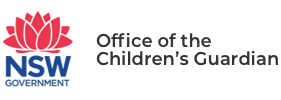Here you will find information to help accredited agencies to stay up to date with their obligations and legal requirements.
This page also includes information for Principal Officers.
Resources
Explore our resources for implementing the Code of Practice for Designated Agencies and Adoption Service Providers. Browse our range of guides and templates your agency can use to help you deliver services and meet accreditation requirements.
Principal Officers
Every accredited agency must appoint a Principal Officer.
The Principal Officer is the person within your agency who has overall responsibility for supervising its arrangements for providing statutory or supported out-of-home care or adoption services.
All Principal Officers must have a current Working with Children Check clearance that has been verified by the agency.
You must notify us if there is a change to your agency's Principal Officer or their contact details. Notifications and changes to agency details should be made using the accreditation portal.
Specific responsibilities of a Principal Officer
Statutory out-of-home care Principal Officers have legal requirements under the Children and Young Persons (Care and Protection) Act 1998, the Children and Young Persons (Care and Protection) Regulation 2022, the Children's Guardian Act 2019 and the Children's Guardian Regulation 2022.
These requirements are:
-
Immediately ensuring notification of a death of a child in care to the parents of the child, and the Children’s Guardian and the Coroner
- Ensuring a behaviour support plan is prepared when a medical practitioner has prescribed a psychotropic drug for the child
- Authorising individuals as authorised carers
- Authorising relative or kin of a child or young person as an authorised carer for the child or young person in an emergency and
- Authorising individuals as an authorised carer to provide respite for other authorised carers.
Statutory out-of-home care Principal Officers have the authority to delegate these 2 responsibilities:
-
Preparing a behaviour support plan that includes psychotropic medication
Authorised carers must notify an agency when a medical practitioner has prescribed a psychotropic drug to a child in statutory out-of-home care. The Principal Officer can delegate the responsibility for preparing a behaviour support plan for the child. However, they must approve the plan. Only suitably qualified professionals should develop behaviour support and management plans in consultation with the child or young person and their carer.
The Behaviour support guidance tool (PDF) (PDF, 158.79KB) has further details. -
Authorisation of carers
With approval from the Children's Guardian, the Principal Officer can delegate responsibility for authorising carers, including respite carers and relative or kinship carers.
Principal Officers seeking to delegate this responsibility to another person must provide a written request to us that includes:
-
details about why they are seeking to delegate this responsibility
- details of the person to whom they propose delegating this responsibility, including their position, and why they are suitable
- confirmation that this person holds a current, verified Working with Children Check Application or Clearance that has been verified by the agency
- a copy of the agency’s organisational chart showing the role of the person to whom they want to delegate this responsibility, and
- the duration of the proposed delegation.
Code of Practice
The Code of Practice commenced on 1 October 2025, replacing the 23 Child Safe Standards for Permanent Care.
The Code of Practice is the new accreditation criteria designated agencies and adoption services will be assessed against.
The Children’s Guardian Regulation 2022 was amended on 1 October 2025 to reflect the Code of Practice.
A suite of resources is available to help the sector understand the practice requirements in the Code, and how we will assess practice against the Code.
Monitoring and assessment framework
Our monitoring and assessment framework focuses on agencies’ quality assurance and continuous improvement systems. Under this framework we have more regular contact with agencies during the accreditation cycle through Agency Status Updates, scheduled assessment and monitoring and responsive monitoring based on risk.
You can read more about the framework in the Monitoring and assessment framework factsheet (PDF, 141.22KB).


